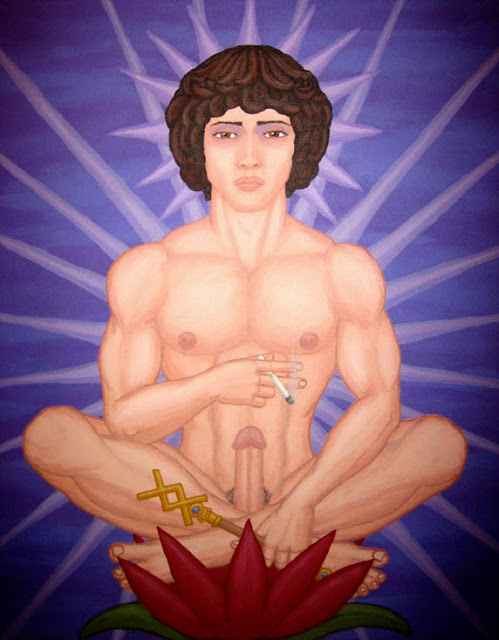By: Bill McMillan
Posted: 3/4/10
Cheryl Ann Costa is and has been many things — an airman, submarine sailor, coast-to-coast talk radio host, television show co-host, playwright, author, filmmaker, coven priest, co-owner of a fabric shop and an engineer at a major Fortune 500 company.
She was also, at one time, a man.
"I am male, female, one, neither," Costa said.
Costa addressed 40 audience members on Wednesday in Hendricks Chapel with an informal two-hour lecture, consisting of a PowerPoint presentation and a Q-and-A session about her thoughts on gender, sex and spirituality.
Costa is a self-described "crazy yogi." A yogi is a practitioner of various spiritual beliefs that often relates to meditation.
"(Yogis) are at the bleeding edge of spiritual exploration - like a research scientist," she said.
Costa began her PowerPoint with three questions: who are you, what are you and what do you want. She pointed to an audience member and asked, "Who are you?" A voice replied with a name. Costa said names are constricting because they are given by parents. She pointed to another audience members and asked, "What are you?" Another voice said "human." Even the term "human" is limiting, Costa said.
"That's like calling yourself a Volkswagen. Or a Toyota - I can't stop," she joked, referring to Toyota's recent recalls.
A central pull of her presentation concerned the difference between sex and gender, two words that are not interchangeable. Concepts like these "lock you down," she said. Costa went on to mention scientific discoveries about animal gender and statistics about lesbian, gay and transsexual.
"I have those that say, 'What the hell is a Buddhist yogi going to tell me about sex and gender?'" Costa said. "I think the biggest thing is to keep the concept that sex are your body parts, gender is what society says you are, and the spirit side of it says you are not your body and you are the immortal part inside of your body. That's the message that you take away from here - stop believing that you are your body."
Spirituality is outside the constricting concepts of sex and gender, she said. The spirit is the part that you can't touch. She encouraged the audience to "let go of human existence" and delved into her beliefs about reincarnation. Costa went on to describe the hierarchy of beings and realms in Buddhism and the process of enlightenment.
"We've all lived in different realms," she said. "We've all lived in different dimensions."
Costa also spoke about her clairvoyant abilities. She recalled seeing her first ghost at her Uncle Nick's funeral. She described this special trait as being "aware of a larger world around" her.
"If you have unfinished business, take care of it now," she said. "It will bind you here on earth."
Jannae Lehman, secretary of Student Pagan Information Relations and Learning, the pagan student organization partly responsible for the event, said she hoped people would leave with a more open mind.
"She's Buddhist and she's also pagan, so she kind of touches everybody," said Lehman, a senior stage management major. "I mean, how often do you get to talk to a transgender Buddhist nun that has lived the life she has?"
Laura Mateya, a junior environmental studies major, said she took away one particularly important message from the lecture.
"I was very humbled by how much she's been through and how open she was to help us understand," she said. "It's OK to be who you are."
wfmcmill@syr.edu © Copyright 2010
The Daily Orange









.jpg)
![Reblog this post [with Zemanta]](http://img.zemanta.com/reblog_b.png?x-id=20d62901-b24a-48a5-9c48-f17d616bd2fe)

![Reblog this post [with Zemanta]](http://img.zemanta.com/reblog_b.png?x-id=91b3b887-709d-427b-be24-7423b618a108)

![Reblog this post [with Zemanta]](http://img.zemanta.com/reblog_b.png?x-id=ace592c3-a3e4-4560-9954-e96a0e161cfd)


![Reblog this post [with Zemanta]](http://img.zemanta.com/reblog_b.png?x-id=77a16ee3-c57e-45eb-8e86-f68dac120f70)

![Reblog this post [with Zemanta]](http://img.zemanta.com/reblog_e.png?x-id=012e4406-86d8-40d1-a997-bc5e5662eed1)




